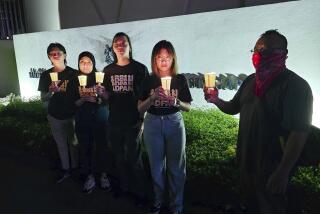Crime in U.S. and Singapore
- Share via
* It is seldom indeed that you provide such vivid and clear comparisons as are found on the Editorial page of April 19.
Side by side are two editorials; one tells of the problems in Chicago public housing, the other the plight of the young man in Singapore.
It is only through hard work that we have managed to create the situation in Chicago. You might say it is our system that has brought this to pass.
In Singapore they have managed to bring law and order to the vast body of the population with a minimum of loss to life or property. Their people seem to approve and like their system.
Which method seems reasonable to you?
RICHARD B. PRIDHAM
Downey
* While Singapore ruthlessly plans to mete out sheer torture to young Michael Fay as supposedly just punishment for an act best termed malicious mischief, the U.S. sputters and pouts and vacillates over issues such as whether to install increased security in public housing projects well-documented as cesspools of violence, drugs and thefts. It’s time to first aggressively act to rescue Fay from this abuse and then stop whining and “clean up our own act.”
What we share with Singapore is an inappropriate response to societal problems at the ends of two extremes.
SUNNY KREIS
Brooklyn, N.Y.
* In Singapore, an American youngster is going to have some permanent scars on his behind after being punished for a crime he committed. This punishment (caning) is very painful and can induce unconsciousness and shock.
I have a permanent scar across my forehead from being attacked in an unlighted parking lot, an attack which left me unconscious and later in shock. This happened in America (Los Angeles, in fact), and my attackers have never been caught, let alone punished.
I am still waiting for a sniveling editorial on my behalf, expressing outrage and indignation at such brutal treatment.
DAVID E. SCOTT
Los Angeles
* It’s difficult to contain one’s anger when reading about former New York Mayor Ed Koch’s notion that we should introduce some sanitized version of caning into our penal system (Commentary, April 20). At the very least, I thought politicians, like comedians, were noted for their timing.
His craven appeal to the public’s rightful concern about crime and safety should not take precedence over the fundamental issues here. Firstly, a young American is about to be brutally flogged (or flayed), and his last remaining hope is for clemency from the president of Singapore. Koch’s article gives Singapore further reason and excuse to ignore pleas for humane treatment of Fay.
Secondly, where is Koch’s support for due process and fair trial? Fay quite likely had his “confession” beaten and intimidated out of him, but even if remotely guilty, no one, neither American nor Singaporean, deserves this form of vicious and sadistic punishment.
If our government and leading politicians are willing to place sanctions on the likes of Taiwan for endangering the white tiger, and South Africa for apartheid, I hope we are prepared to repay Singapore, that modern-day Carthage, in kind. Koch should get his head out of its dark place and reflect upon what he and others like him have done when they have brayed the cry of too much crime and too little punishment.
ERIC CHARLES PARLEE
Santa Monica
* I am a 16-year-old student and a former student ambassador to Singapore. I am aghast at the volume of letters and articles I have read that support the inhumane caning of 18-year-old Fay. Many Americans seem to think that the introduction of caning into this country would magically erase criminal and gang-related activity. They are wrong. Singapore is so wonderfully clean and safe due to its multitude of repressive laws that successfully smother free speech and any opposition to the government. If that is what some Americans are looking for, they’d better move to Singapore. Despite the overwhelming contrast of seemingly trouble-free Singapore and the many serious problems that exist in the United States, I would rather live in a country where freedom of speech and political views takes precedence over fantasies of a utopia that will never exist.
JAMIE WEISS
Los Angeles


